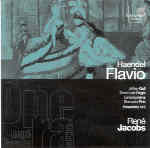Coming right on the heels of the New York City Opera’s first-ever production of this opera is the re-release of its only–and only necessary–recording. Flavio comes from a fertile period in Handel’s output, but despite the presence of Cuzzoni and Senesino, two of the most important and lauded singers of the day, it flopped when first presented in 1723. This is probably due to the fact that it’s a comedy that turns tragic before ending happily–and London audiences simply couldn’t get their heads around such a thing. Whatever the case, it contains aria after aria, with a duet thrown in–and each one is short, to the point, and always entertaining. The instrumental textures are never complex–and the rhythms, mostly upbeat, keep the opera moving at an almost sitcom pace. I won’t go into the plot because it’s not that hard to follow, but rest assured that this performance is dynamite.
Flavio, a whimsical dandy of a king, is countertenor Jeffrey Gall, and he captures just the right edge of petulance for the character, while the more leading countertenor role, Guido (the Senesino part), is sung by Derek Lee Ragin, whose somewhat fiercer tone is fascinating and whose flexibility is remarkable. His love in the opera, Emilia, is Lena Lootens, the possessor of a lightish, pretty, but expressive voice, and her grief is as palpable as her love.
The secondary couple-in-love includes mezzo Bernarda Fink in the trouser role of Vitige, and her dark, fluid sound is just right. Her love (also the object of King Flavio’s) is sung by Christina Högman, and she’s as effective when flirting as she is when enraged in the last act. Tenor Gianpaolo Fagotto is fluent in coloratura, and bass Ulrich Messthaler has authority as Lotario, Emilia’s father. René Jacobs leads Ensemble 415 in a performance that equally captures the score’s lightness and gravity without ever throwing the balance off. That is, he makes sense of the complications. In a word, this is wonderful.
































